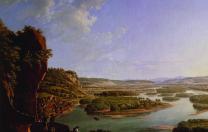The job of remaking the Mississippi River, Mark Twain wrote in the 1870s, is “a job transcended in size only by the original job of creating it.” In that turn of phrase, Twain captured not only the immense scale of diking and damming of the river, but also the hubris of the men who thought to tame it. That the river’s subsequent history did not unfold as plannedfloods arose of unprecedented destructive power, acres of land per hour began to disappear in the delta, and Katrina inundated New Orleans last yearsuggests that perhaps the Mississippi project was a case of exceptionally bad planning. But human interventions in the natural world frequently lead to unpredicted outcomes, and David Blackbourn documents them in all their intricacy.
Blackbourn believes that even in our age of “sound bites and simple story lines, with its inbuilt bias against complexity,” it is possible to hold two opposing ideas in one’s head. He fairly embraces complexity. Ask him, for example, how he became an historian of Germany. “There’s a lot of contingency involved,” he says. Though better at literature in school, even as a child he’d been fascinated by picture books of history. And although he’d studied both French and German, he became better at the latter because of time spent in Germany, part of it as an exchange student. And there was a mentor, Norman Stone, who later became his dissertation adviser at Cambridge, who got him excited about the trajectory of modern German history. “It was a time of exciting debates about failed modernization there,” he says, “so it was a mixture of the personal, familiarity with Germany, and the particular influence of one particular teacher.”
His first visit to the United States was also life-changing. Arriving in New York around Easter time in 1976 to visit a friend who was getting her Ph.D. at the City University of New York, he found the city “just mesmerizing.” After four weeks in Manhattan, he discovered on his return to England that he could no longer stand Cambridge“this fenland town”and cut short a research fellowship to take a position in London.
His subsequent work has focused on the political, social, and cultural history of nineteenth-century Germany. Blackbourn, who has been at Harvard since 1992 and was named Coolidge professor of history in 1997, is the author of seven books. The best known are The Peculiarities of German History: Bourgeois Society and Politics in Nineteenth-Century Germany (1984), written with Geoff Eley, which argues against German exceptionalism; The Long Nineteenth Century: A History of Germany, 1780-1918 (1997), which chronicles the transformation of Germany from “a land of poets and thinkers” into an industrial and military powerhouse; and Marpingen: Apparitions of the Virgin Mary in a Nineteenth-Century German Village (1993), which details how economic, social, political, and cultural forces created “a town without men” and set the stage for a series of religious visions.
None of these books appears to presage The Conquest of Nature. But in his portrait of Marpingen, which documents the ways in which life in a single village was connected to the broader currents of the period, Blackbourn moves deftly between the provincial and the societal, and between the past and the present. Of the Marpingen events, he writes, “As a battle of faith against reason, superstition against science, Marpingen seems to fit into a familiar pattern, and some will see uncomfortable parallels with our own time.” With his latest book, overt comparisons to the present hardly seem necessary, so clear are the connections to recent environmental disasters long in the making, such as happened in New Orleans. Much more than an environmental history, the new book reflects Blackbourn’s belief that understanding the broader context of events is critical. As he told an Oslo audience while working on the project, although environmental questions are important in their own right, “if the environmental perspective is to become part of mainstream history...political and cultural associations cannot be avoided.” Nature (including human constructs of what is natural) “is a nodal point where the environmental, economic, social, cultural, and political come together.” He concluded by paraphrasing the contemporary German historian Christof Dipper: “By understanding the human dominance of nature, we learn more about the nature of human dominance.”








